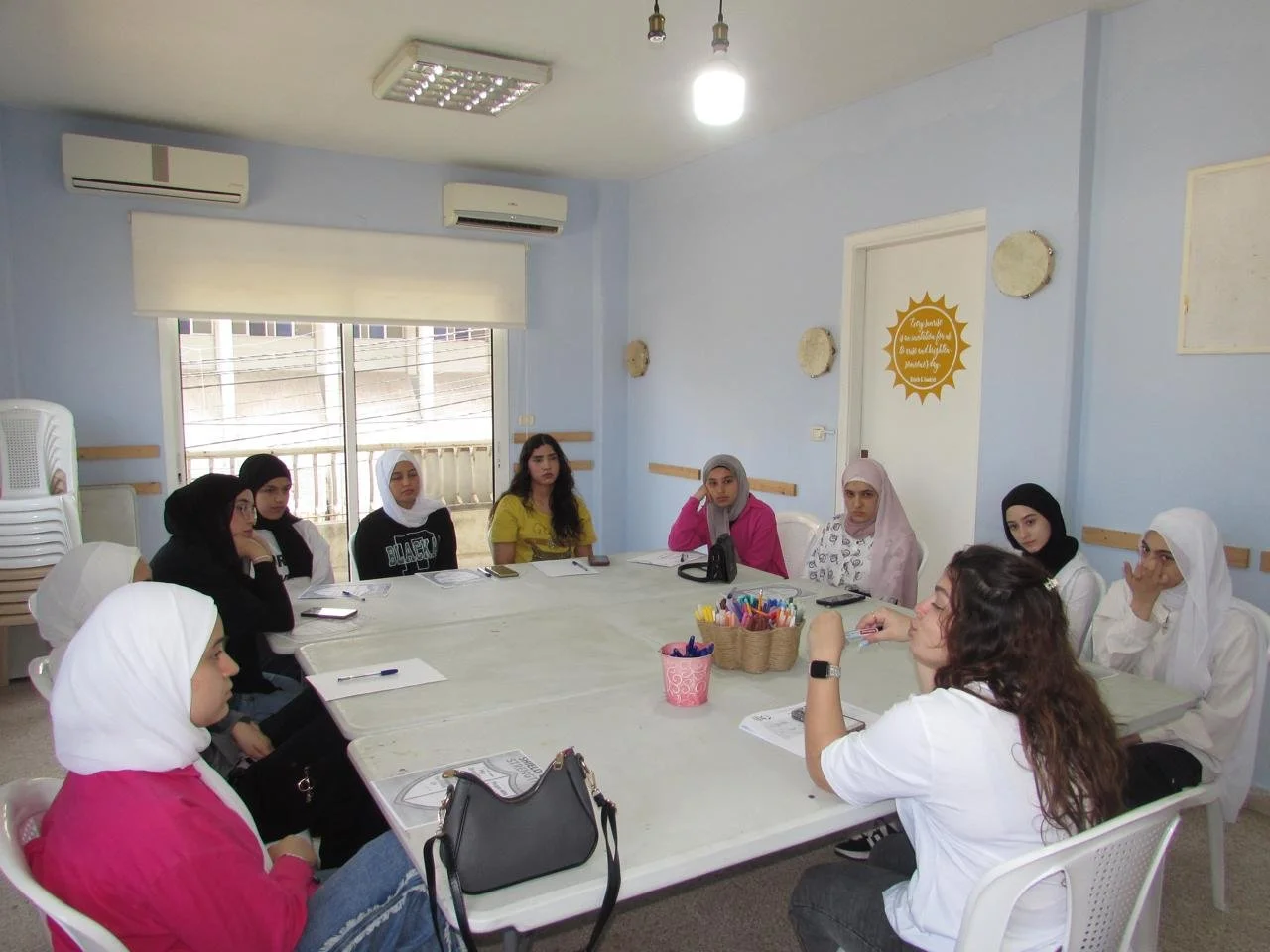
MECC
The Middle East Council of Churches and TearFund Contribute to Strengthening Mental Health in Lebanon
A New Workshop Entitled "Connecting Minds and Hearts"
Amidst the difficult circumstances affecting the people of Lebanon and the region, the Diakonia and Social Service Department – Lebanon’s Office at the Middle East Council of Churches (MECC) seeks to raise mental health awareness in various communities to alleviate daily pressures and psychological burdens.
In this context, the Department, in partnership with TearFund organization, organized a new workshop entitled "Connecting Minds and Hearts." Participants were humanitarian and social workers, and MECC volunteers, from different Church Families. It took place from August 4 to 7, 2025, in Beirut.
Video - What Are the Details of the Homecare Services Platform Launched by MECC?
*Home care services are available at reasonable and discounted prices.
Stemming from its belief in the importance of serving with dignity, the Middle East Council of Churches (MECC) launched a new platform for homecare services in Lebanon, enabling service seekers to identify certified caregivers who have undergone extensive health training with Saint George Hospital University Medical Center (Beirut, Mount Lebanon, and Tripoli) and Khoury General Hospital (Zahle, Lebanon). Hence, the platform offers a variety of home services related to elderly care, mothers and newborn care, as well as babysitting and childcare.
In this context, the video sheds light on how this platform works and the details of its services.
Signing of an Official Cooperation Agreement Between the Middle East Council of Churches and Makhzoumi Foundation
A Joint Program Aiming at Establishing a Culture of Social Entrepreneurship in Lebanon
What Are the Details?
In a step towards enhancing the social and economic situations in Lebanon, a cooperation agreement was signed between the Middle East Council of Churches (MECC) and Makhzoumi Foundation to implement a loan provision program aiming at empowering Micro, Small and Medium Enterprises (MSMEs) located in North and Akkar governorates.
This signing took place during an official meeting held on Wednesday, July 30, 2025, at the headquarters of the Makhzoumi Foundation in Beirut. It was attended by the Secretary General of the Middle East Council of Churches Professor Michel Abs, and the President of Makhzoumi Foundation Mrs. May Makhzoumi.
MECC Distributes Fodder, Veterinary Medicine, and Food Baskets to Support Rural Families in Dara’a
The Middle East Council of Churches (MECC), through its Service and Relief Department – Diakonia, continues its efforts to support the livestock sector and enhance livelihoods and food security in rural areas, as part of its ongoing mission to assist the most vulnerable families and alleviate increasing living burdens.
In this context, 134 livestock breeders in the villages of Deir al-Bukht, Khirbet Ghazaleh, and Al-Kutaybeh in rural Dara’a were supported through the distribution of 220 rations to cover 220 heads of cattle. Each ration consisted of 900 kilograms of mineral-fortified pelleted fodder and 720 kilograms of hay. In addition, veterinary services, medications, and vaccines were provided, along with one food basket for each of the 134 breeders’ families.
The beneficiaries also attended training sessions on proper cattle care, ways to manage common livestock diseases, and optimal nutrition practices to improve the quality and quantity of milk production.
Video - The Middle East Council of Churches and “Kerk in Actie” Organization in the Netherlands Contributes in the Restoration of the Cilicia School in Aleppo
As part of the Program “Restoration Fund for Rehabilitation of Faith-based Social Services & Religious Infrastructure Damaged During the Crisis in Syria”
The MECC Diakonia and Social Service Department, Lebanon’s Office
Implements Emotional Support Sessions for Youth Girls in Lebanon
With the intensification of daily challenges, the Diakonia and Social Service Department, Lebanon’s Office, at the Middle East Council of Churches (MECC), organized a program titled "Emotional Support for Youth Girls" with two groups of adolescent girls aged 12-14 years and 15-17 years. The program aimed to empower them, enhance their mental health, and help them overcome the difficulties they may face.
This program, which extended over many weeks, comes at a time when both parents are obliged to work to sustain their households, and many children and adolescents are left alone without the proper guidance and the necessary counseling of their loves ones. As such, they are left to deal with the different hurdles in school or society in general without getting the proper chance to talk about what they go through.
Video - A Special Episode of "Don't Be Afraid" Program on Télé Lumière and Noursat TV Channel, About the Activities of the Diakonia and Social Service Department and the Home Care Program at MECC
Service with Dignity! What are the most prominent humanitarian programs of the Middle East Council of Churches (MECC)? What is its field relief role?
The answer is with Nina Hallak, the Director of the MECC Diakonia and Social Service Department, Lebanon’s Office, and the Nurse Roula Al-Sahwi, the Coordinator of the Home Care Program at MECC, in a special episode of "Don't Be Afraid" program on Télé Lumière and Noursat TV Channel, prepared and presented by Father Charbel El Khoury.
Service with Dignity
Video - A Special Episode of the program "Don't Be Afraid" on Télé Lumière-Noursat about the MECC Diakonia Department, Lebanon’s Office
What programs and projects does the Diakonia Office in Lebanon, at the Middle East Council of Churches (MECC), offer? Are there any challenges?
What is the importance of constructive workshops targeting women, families, and institutions?
What is the role of the Home Care Services Platform at the Middle East Council of Churches?
You can know more about these topics and other topics with
Nina Hallak, Director of the Diakonia Office in Lebanon at the Middle East Council of Churches, and the Nurse Rula Al Sahwi, the Coordinator of the Home Care Program at the Council, in an interview with Father Charbel El Khoury on the program "Don't Be Afraid," live on Monday at 8:30 pm on Télé Lumière_Noursat.
The Middle East Council of Churches Participates in the Rachid Karami International Fair – Tripoli, Lebanon
As part of its human capacity building objectives, the Diakonia and Social Service Department, Lebanon’s Office, at the Middle East Council of Churches (MECC), continues to implement its food security program with the participation of a group of Lebanese women in the villages of Hmayra, Ouwaynet, and Machta Hassan.
The three-year program includes several diverse sessions on how to properly produce mouneh and its necessary steps. It also covers marketing methods and its basics, as well as the importance of using social media for this purpose. The sessions also help participants overcome the challenges they may face in this field and give them the opportunity to participate in many exhibitions.
Hence, the Middle East Council of Churches (MECC) is participating through this program in the Rachid Karami International Fair, where you can find the participants' products, from June 5 to 9, 2025, between 4 pm and 12 am, in Tripoli - Lebanon.
It is worth noting that this program is implemented with the support of the international organization Evangelical Lutheran Church in America (ELCA).
With the Aim of Empowering Their Role in Society
MECC Organizes a Health Awareness and PSS Training for Deaf and Mute Women
In a first-of-its-kind initiative, MECC, through its Service and Relief Department – Diakonia, organized a health awareness and psychological support (PSS) training for deaf and mute women in Damascus.
Twenty-four women participated in the training which focused on delivering information through sign language using simplified methods that take into account their specific needs.
After the training, the participants visited five families that include deaf and mute individuals, where they shared the useful information they had received.
This initiative falls within the framework of efforts to effectively integrate deaf and mute women into society and to empower them by expanding the circle of beneficiaries and spreading awareness in the community.
One of the participating women, aged 30, said: “this was the first time ever she had attended a health awareness and PSS training tailored for the deaf and mute.”
Video - Details of the Home Care Services Platform at the Middle East Council of Churches
*Home care services are available at reasonable and discounted prices.
Video - What Is the Middle East Council of Churches’ Home Care Services Platform?
*Home care services are available at reasonable and discounted prices.
The MECC General Secretariat Team Holds Its Weekly Meeting
Praying for the Ascension Thursday
The Secretary General of the Middle East Council of Churches (MECC) Professor Michel Abs presided over the weekly meeting of the MECC General Secretariat, with an online participation of the Associate Secretary General Reverend Dr. Refaat Fikry, and colleagues from various departments, in person and online. The meeting took place on Tuesday, May 27, 2025, at the MECC headquarters in Beirut.
As is customary, the meeting began with a Biblical Reading, which this week focused on the Gospel of Luke 46: 24-53 and Acts 1: 1-14. The attendees then raised their Prayers on the occasion of the Ascension Thursday, saying together, "Lift with you, O Lord, our souls and minds from emptiness and temporal concerns to divine understanding and truth."
The Head of the Committee of the Coptic Orthodox Church in Lebanon Deacon Royce Bahjat Samir Malak Hanin, Meets with the MECC Secretary General Professor Michel Abs
The Secretary General of the Middle East Council of Churches (MECC) Professor Michel Abs received Deacon Royce Bahjat Samir Malak Hanin, Head of the Committee of the Coptic Orthodox Church in Lebanon, appointed by His Grace Anba Antonios, Metropolitan of Jerusalem and the Near East for the Coptic Orthodox Church, and President of the Middle East Council of Churches (MECC) for the Eastern Orthodox Family. The meeting took place on Tuesday, May 27, 2025, at the MECC headquarters in Beirut.
Attendees were Ms. Nina Hallak, the Director of the Beirut Office in the Diakonia and Social Service Department at MECC, the Journalist Lea Adel Maamary, the Media Officer, Coordinator of the Church and Media Relations, and Director of the Platform of the Word at MECC, and the Council's Media Team.




















